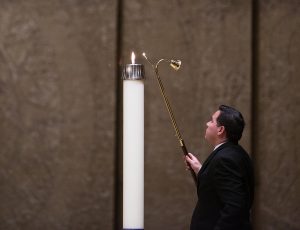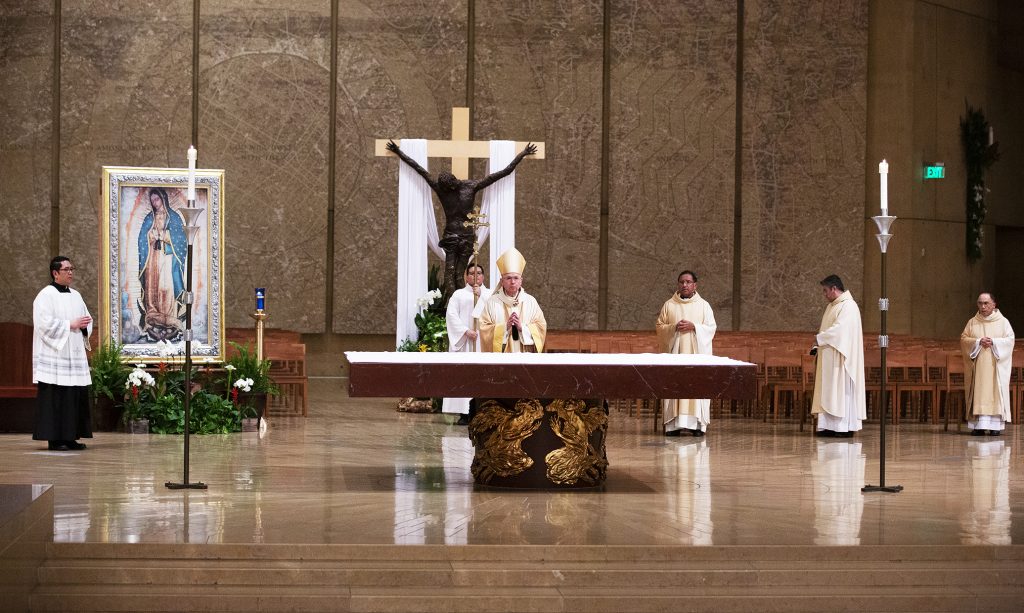Across two Sundays in early March, RCIA candidates and catechumens stood shoulder to shoulder in the sanctuary of the Cathedral of Our Lady of the Angels during the Rites of Election and Calling.
Godparents and sponsors prayed alongside them as they continued their walk with God through the repentant days of Lent into Easter, not yet fully aware of an invisible enemy that would change the trajectory of their journey during the holy season.
The threat of the coronavirus (COVID-19) still felt somewhat elusive in the U.S. at the time, but in a matter of weeks the world went dark. Stay-at-home orders were issued, while churches, schools, and businesses closed after the World Health Organization declared the global outbreak a pandemic. All baptisms and confirmations have been delayed until further notice.
In his Easter Vigil homily, Archbishop José H. Gomez noted the consequences of this chain of these somber changes and addressed the elect directly:
“We die and rise with Jesus in baptism, St. Paul tells us tonight. And if we die with him, we shall live with him, we shall walk in ‘newness of life’ — on the road to heaven and eternal life with God. This is the beautiful reality of Christians’ lives.
“That’s why it is also a sadness tonight that we cannot welcome the elect in baptism. We grieve that we cannot be together tonight and we are praying for all of you in a special way, my dear brothers and sisters. We look forward to the day when we can celebrate your new birth through grace, and number you among the children of adoption in Christ.”
In a strangely reassuring turn of events, private celebrations of the Mass without the lay faithful continue behind closed doors before rows of empty pews. The elect and the candidates of our diocese are not alone in their longing to sit at Christ’s eucharistic table. Millions of Catholics across the world wait with them.
During Pope Francis’ extraordinary “urbi et orbi” (“to the city and the world”) blessing on April 12 — flanked by the “Salus Populi Romani” icon and the miraculous crucifix from the Church of San Marcello del Corso, both present among the faithful during times of plague — the Holy Father reflected on Jesus’ words to his disciples: “Why are you afraid? Have you no faith?”
He continued: “Faith begins when we realize we are in need of salvation. We are not self-sufficient; by ourselves we flounder: We need the Lord, like ancient navigators needed the stars.”

In our hour of need, the Lord gives us a divine opportunity. “When it is all over you will not regret having suffered; rather you will regret having suffered so little, and suffered that little so badly,” Blessed Sebastian Valfrè, who tended to the poor and war-torn during his time, once said.
While the plague spread quickly across Europe, St. Catherine of Siena nursed the sick without hesitation. During the plague of 1576, while the nobility fled the city and churches were closing, St. Charles Borromeo, archbishop of Milan, offered Mass in the streets, using his own money to aid the suffering.
For those being initiated into the mystical body of Christ, the lessons from our classrooms about the tenets of our Faith are being lived out in ways we never imagined we’d be seeing. Stunning acts of courage and charity in our hospitals and neighborhoods offer hope. The love of Christ is alive and at work among us, even in this dark space of the unknown.
If you are currently left yearning to be received into the Catholic Church, it may be comforting to remember that the sacramental graces of the Faith don’t end with Easter. A deep desire for the true presence of Christ will not diminish once finally taking your place in the Communion line. Your studies during the preceding months — and in some cases, years — have prepared you for this moment. This is only the beginning.
Jesus tells us in John 15:4: “Abide in me, as I in you. As the branch cannot bear fruit itself, unless it abides in the vine, neither can you, unless you abide in me.” This vital and soul-nourishing union with Christ demands our patience, trust, diligence, and love during this difficult season of waiting.
“God has brought his children out of persecutions, famines, and pandemics,” Archbishop Gomez told the faithful on Easter night. “We are children of God, and even in these difficult times, he knows our needs, and he will give us every good gift. He will deliver us from this evil as he brought his people out of Egypt, and brought them back from exile. Christ is risen and we will rise with him!”
St. Charles Borromeo reminds us that, “If we wish to make any progress in the service of God we must begin every day of our life with new eagerness.” Now sounds like the perfect time to keep discovering the sacred in unexpected ways.

